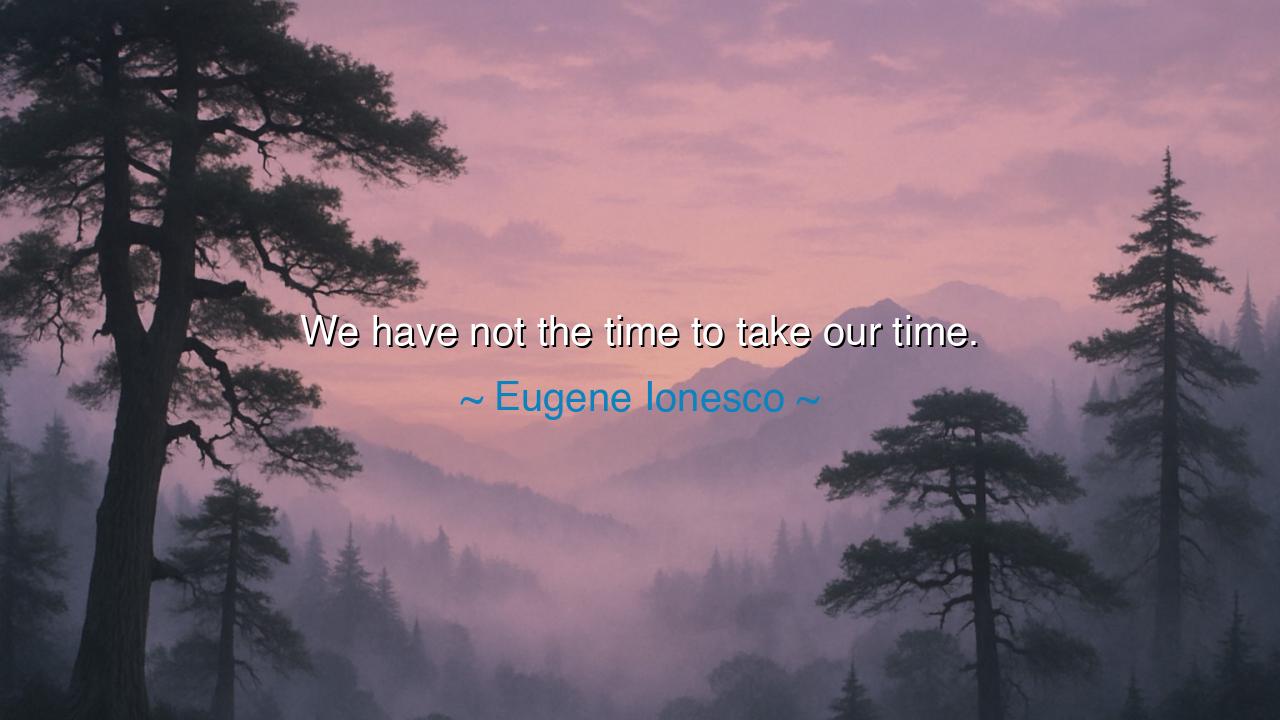
We have not the time to take our time.






The playwright and thinker Eugene Ionesco, whose works revealed the absurdity of modern life, spoke with piercing urgency when he said: “We have not the time to take our time.” This paradox strikes the heart like a sudden bell. For what he meant is this: life is brief, fragile, ever fleeting, and yet so many squander their days as though they were infinite. He warns us that though we may wish to linger, though we may wish to delay, the clock does not grant such luxury. Time itself does not wait—it consumes.
The origin of these words is found in the reflections of Ionesco, who lived through the turbulence of the twentieth century, an age of wars, revolutions, and existential dread. As an artist of the theater of the absurd, he sought to awaken humanity from the slumber of routine and false comfort. He saw people wasting their days in trivialities, as though tomorrow were guaranteed, when in truth, tomorrow is never promised. Thus he fashioned this sentence as both lament and command: we cannot afford idleness, for the river of time carries us swiftly to the sea.
The ancients knew this lesson well. Marcus Aurelius, emperor and philosopher, wrote in his Meditations: “You could leave life right now. Let that determine what you do and say and think.” To the Stoics, awareness of mortality was not morbid, but liberating—it spurred them to action. So too with Ionesco: his words remind us that time is not a resource we can leisurely stretch or save. It is already vanishing as we speak. To “take our time,” as though it were endless, is to live in delusion.
History offers vivid examples of this truth. Consider the voyage of Christopher Columbus, who dared to sail west into uncharted waters. He did not “take his time,” for hesitation would have meant losing support, losing courage, and losing the moment when fate beckoned. Or think of Abraham Lincoln, who in the chaos of civil war knew that he could not delay the Emancipation Proclamation indefinitely. Time pressed upon him, and he seized the hour, changing history. In each case, the refusal to drift gave birth to destiny.
The meaning of Ionesco’s words, then, is not that we must rush blindly, but that we must live with intensity, decisiveness, and purpose. The illusion of endless tomorrows robs men of action; the recognition of fleeting time steels them to act while they may. Life is not meant to be wasted in hesitation, nor squandered in idle comforts. We must spend our days as if they were coins we cannot keep, only give.
The lesson is clear: do not postpone the good you might do today. Do not delay your growth, your calling, or your acts of love, waiting for a more convenient season. Seasons change, years vanish, and opportunities fade. To “take your time” is often to lose your time. But to act with courage now is to claim the present as your own.
In practice, I counsel this: rise each morning with urgency, not in panic, but in clarity. Ask yourself: “If today were my only day, how would I live it?” Choose tasks of meaning, words of kindness, and deeds of purpose. Cut away the trivial and stand firm in what matters most. Do not wait to reconcile, to create, to begin—for time does not wait, and the race is already being run.
Thus, remember the eternal cry of Eugene Ionesco: “We have not the time to take our time.” Do not walk as though you owned eternity, but run as though each breath were a gift of immeasurable worth. Live with urgency, live with passion, live with wisdom—for the hour is short, but the legacy of how you spent it can be everlasting.






AAdministratorAdministrator
Welcome, honored guests. Please leave a comment, we will respond soon